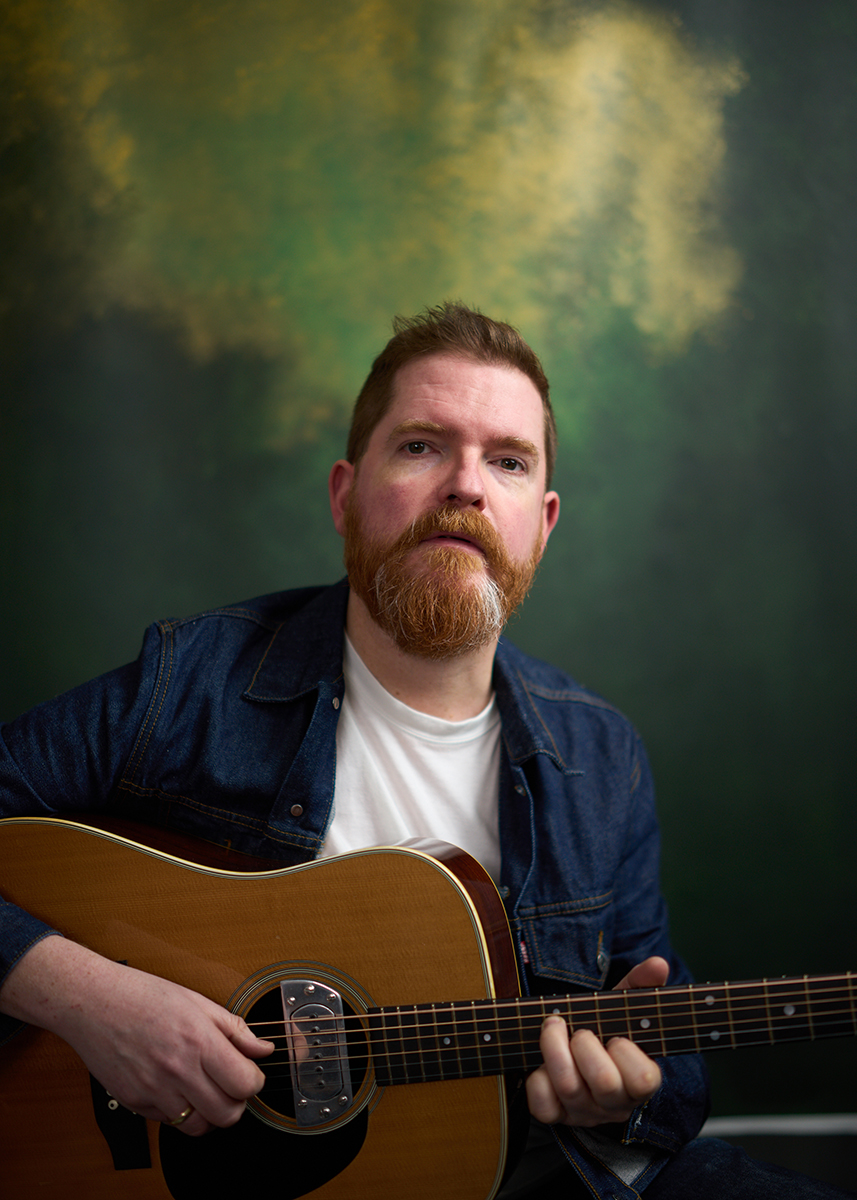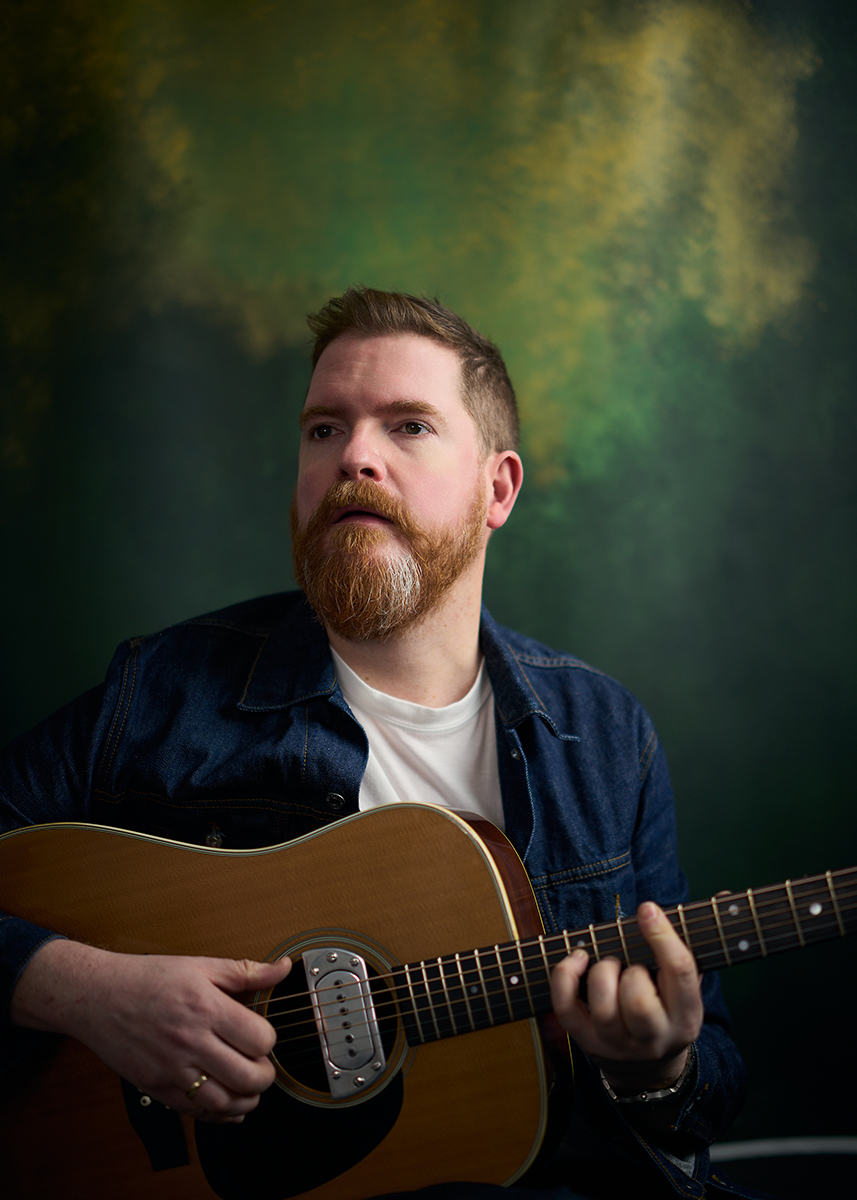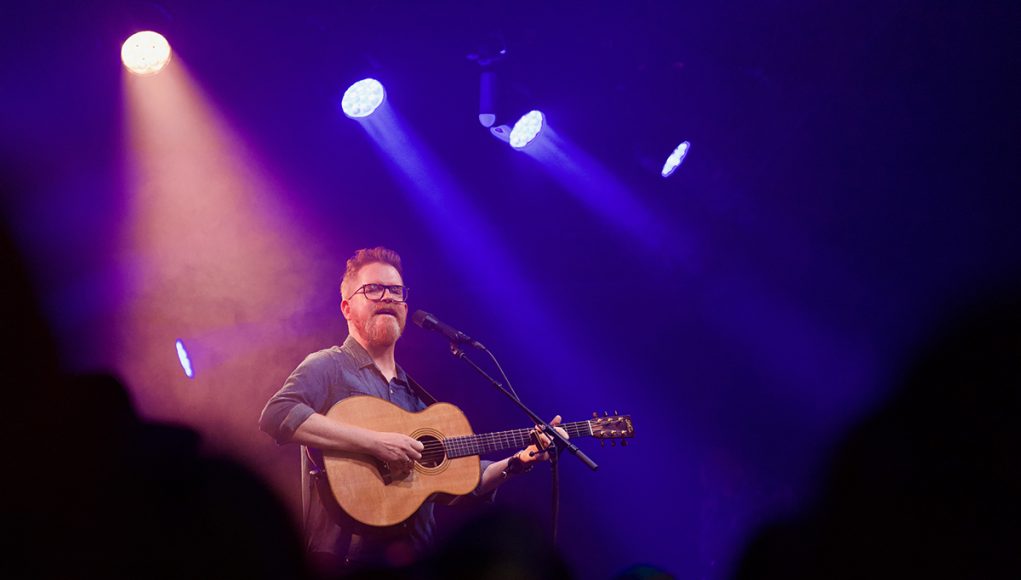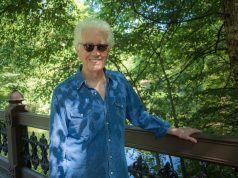It’s an interesting idea, to re-visit past songs, and reinterpret them in a different way. How did you choose the songs for this collection? Did you base the choices on crowd favourites from your concerts?
Well, it was more a feeling that some of the songs had taken on a life of their own, as I played them more and more, and become something different with the passing of time. It may be that I felt I didn’t record them well enough at the time to do them justice, or maybe it’s just that they weren’t quite ready to be recorded. So, when I was listening to them as I played them on tour, I started to think it would be nice to maybe do some of them over again. I set myself two goalposts as parameters for the choices. In the first place, if I thought I had done a good enough job the first time around, I wouldn’t consider re-recording the song. And the second factor was, if it felt like it was a song that could benefit from further exploration, and it felt like the audience really enjoyed the song, then I would consider it for some further examination, and see what would develop. Those were the two parameters that led eventually to the ten songs that I chose. I didn’t get to do Tenth Anniversary tours of albums, because Covid put paid to that. So, I thought I would celebrate the anniversaries of three albums, rather than just one.
Do you think you might extend this re-examination of your work? Because any song is of its time, you write it and record it, and it’s done, set in stone, it can’t be changed in any way. But over the passage of time, any song must naturally evolve and change in the way you think about it, and the way you perform it as well.
I’m not sure really. This felt like the right thing to do at the time, and maybe, in years to come, there will be another set of songs and that will become Volume Two, but right now, I can’t say about that. I can say that I am already planning my next album to follow this one, and it’s not going to be a similar re-visit of past songs. I think any musician who is writing and recording songs is always looking forward, rather than backwards, and looking to develop new ideas and new material, for themselves as much as for their audience.

Were your instincts right, were your choices the right ones every time, or were there any that actually didn’t work out in the end?
Yes, there were a couple. I chose twelve songs and recorded them, and ten of those made it onto the album. The other two are hanging around for maybe a ‘next time’, if there is one. I find that when you are in the studio, and you press Record, the song will take you where it takes you, if you are a musician who is willing to be led, and I am one of those. I tried to make the process as instinctive as possible, and throughout the recording I went with what felt good to me at the time. So, there were two songs that I thought would work out, and fit in with the rest, and when I finished them and listened back to them, I decided that they were not as good a fit as I thought they were going to be, so I left them out. You have to live with what you make, and over time, you do learn to trust your instincts, and go with what they are telling you.
Do you write more or less constantly, or do you set aside time for writing sessions when you know you are due to record an album?
I do set aside specific time to write, but also, I think about music pretty much constantly, I always have ideas going through my mind, and some of them make it through to become finished songs, and others don’t, but the process goes on more or less all the time. That said, when I finish my current tour, I will enjoy Christmas at home with my family, and have a break, and when that is over, I will shut myself away and start processing the ideas that have been coming to me, and formulate them into some songs. I find that focuses my mind better, I hate to be not doing anything for too long, so setting a period of two or three weeks to write, and get some ideas down, is the best way to work for me. I am happy to switch off for periods of time when I have been busy, and I think everyone has times when they do dither about and don’t do much, but I do get down to the work again when it’s time. I stay focused and ready for ideas to come, if you want to lift something, you have to be strong to be ready, I can work off other people, if we are together, but if I ever tried to sit down at a desk and write a song, it would either be rubbish, or it would be really, really hard to get anything, so I don’t actually work that way. Just practice a lot and play a lot, and be ready when the ideas come to you.

You started out playing more or less anywhere you could set up and get a performance going, cafes, theatre foyers, art galleries was that valuable experience when you eventually became a professional musician?
Absolutely. I learned early on that you have to create a scene to work in it. There wasn’t really a Folk scene as such in Liverpool, when I started out. I just made one, with a couple of friends. We decided there was going to be a scene, and we made it happen. There was a Poetry scene going on, and we began sharing venues, and I ended up booking acts that were much more successful than I was, and bringing them to the city to play, and creating a Folk and Roots scene. At the same time, I was working five part time jobs, and really scrabbling to make ends meet.
It’s surprising that a city with such a reputation for music as Liverpool, didn’t have a Folk scene when you started.
It was the early 2,000’s, and the accent was definitely on Rock And Roll and Psychedelia, Liverpool has always had a really strong Psychedelia scene going on. The Zutons and The Coral were coming up then. I would be the first act on, for a ten-band bill with The Zutons or The Coral at the top of it. And I was hustling to get to a level where people would pay to come and see me play. Then I was invited to a guitar festival in Scotland, and at the end, they gave be a cheque that was the equivalent to what I would have earned in a week from all my other jobs. So I quit, and became a full-time musician. Then I was really broke! When I quit each of my other jobs, they said, OK, see you back here in three weeks, but I have never worked for anyone but myself from then until now.
It must have been a scary prospect, but then you had nothing to lose.
Exactly, I had nothing to lose. I went to a venue that was holding a Songs Of Nick Drake Evening, and they wouldn’t let me play, so while that was going on upstairs, I was busking in the foyer downstairs, and playing some Nick Drake songs, and some by John Renbourn and John Martyn. And at the end of the night, someone came up to me and told me they were looking for someone to open for a John Martyn gig in Buxton. The first thing I said was, Where’s Buxton? The only places I knew were London, Devon, and Liverpool. And the second thing I said was, Yes please. Next day I went to a friend’s house and burned a collection of songs onto a CD, and made a hundred copies of it, and hand-drew the sleeves for each one. I went to Buxton, opened for John Martyn, sold all the CDs for cash, and used the money to record my first album. Then I was invited to go on tour with John, and that was it, I was rolling, the start of my touring career.
You don’t sound like a native of Liverpool.
No, I’m not, I was born in Essex, I grew up in Devon, and went to Liverpool to study when I was nineteen, and after that I just stuck around. It does feel more or less like my home city now, a big part of who I am comes from my time in Liverpool.
You must have learned a lot from John Martyn, not just watching him play, but traveling with him, and spending time with him away from the concerts.
I did, absolutely, I learned a lot. I got a very good piece of advice from John’s minder on that first tour, he told me, Support acts should be heard, not seen. So I took that on board, and I stayed out of the way. As time went on, I got to know John, when he was willing and able, I would spend time in his dressing room, talking with him. You never knew which version of John you were going to get, that’s well documented by people who knew him. Sometimes I had the life scared out of me, and other times he was the most wonderful generous warm-hearted person you could wish to meet. It taught me about touring, what it can do to you, and also, watching a man who was entirely at home pouring out his soul to a thousand people for an evening.
Do you think that your musical identity is something you can set out and plan, and work out, or does it grow around you almost organically as you develop as an artist?
I don’t think I’ve ever had a very strong sense of who I am, in that context. I think the safest position is not to try and ‘be’ a certain someone, just let the songs speak for me. I think early on in my career I did try and create a persona, that looked and sounded a certain way. And I realised that all I was doing was making someone called ‘John Smith’ who wasn’t actually me at all, so I just let it go, and now I sing the songs, and let things just happen around me, that’s far better and more comfortable, it creates far less anxiety. I’m never going to be David Bowie, adopting various personas, I’m always going to be me, enjoying what I do. I also learned that if you travel the world, feeling tired most of the time, the only person who is going to be there with you the whole time, is you, and you’d better like yourself and not be bored or angry with yourself, Just keep it nice and simple, it’s much easier that way.
Speaking of playing all over the world, is there anywhere that is a particularly strong fan base for you?
Well, I have toured America very hard, and Australia very hard, and I do love to play in Europe. I recently played a show in Belgium and it was one of the most rewarding and enjoyable shows I have ever had, so right now, this minute, Belgium in the place.
Has the Internet been a big help in getting your music known around the world?
It has, it does put your profile and your music out there, it’s true. But also, it allows people to pay pennies to own that music. If I had a payment for all the streams I have had, I’d be living in a massive mansion somewhere. The best you can hope for is to make your music, and play it for people, and if I can do that, I’m really happy.
Is there any reason why you choose open tunings to play your songs?
It’s really just a way of playing that feels the most comfortable for me. I feel that the guitar is like a sacred place for me, I imagine it is how it feels for a Christian to walk into a church. When I pick up a guitar, I feel a profound sense of security and peace, and playing open tunings enhances that atmosphere for me. It lets you feel the atmosphere and the feel of a really big church, that’s what it represents to me. If you go from an F# to a Low B, it’s like being in a cathedral, there is a wonderful atmosphere.
Are you a collector, or do you tend to stick with one guitar
I probably have around eighteen instruments, and that includes a couple of banjo’s as well. My main guitar is this Fylde Alexander, which is spectacular, It’s Brazilian rosewood that Mike Waterson found, and gave to Roger Bucknall, and Roger used it to make a guitar for Martin Simpson, one for Richard Hawley, and one for me.
Have you got a particular favourite song off the new album?
Right now, it’s To Have So Many which I recorded with Lisa Hannigan and The Staves. That where the notion of ‘gatherings’ comes in again, it’s about getting friends into the studio together, and see what happens. They started working on the song, and it took on a new shape and feel that I could never have created on my own. It’s a song that was on my first EP, and then my first album, and the re-making of it turned out exactly how I wanted it to be. Always aim to work with people who can do things you can’t do!
Have you got any thoughts about your next project?
Not yet, really. When the tour gets going, after half a dozen shows, I will start thinking about ideas during soundchecks, that’s when ideas start to work out, and I’ll maybe start getting a few things together then. But not before, my mind is focused on this album right now. I have got an idea, but I’m not going to talk about it in case I curse it!
Because there are so many artists out there, and that goes treble for acoustic musicians, because it is so much less expensive to do, have you any advice for readers?
My advice is, play gigs, as many as you can. People talk about being ‘viral’ on Tik Tok and all that, but honestly, I think the more you look at yourself on your phone, the more insecure you get, it takes a particularly strong mind to work through that sensation. For me there is no substitute for doing what acoustic players have always done, which is go out there and play as often as you can to as many people as you can. There is no short-cut around that, it’s still how it works. Don’t sorry too much about how you look, concentrate on how you sound, that is what matters. And if you are having an ‘artistic temperament’ day and you don’t feel like getting out of bed, get out of bed, and go to work. If you’re not willing to put this ahead of parties, socialising, weddings, funerals, everything like that, then do something else, because this is not for you, and you are not going to make it. These days, people just want to be ‘famous’ which is not a good thing. I think being famous for its own sake must be horrible. But if you want to be famous as a musician, as a songwriter, then you have to accept that it is really really hard. I have made so many sacrifices, and I don’t regret any of them, but there are times when you wonder what you are about to do. Am I really about to remortgage my house so I can make an album, and put the home of my wife and family at risk? And you are because you know that you have to do it. You are only going to be truly happy doing this, and you accept what goes with it, and just how hard it really is.
Can you imagine playing, and looking out either into the audience, or at the side of the stage, and seeing a hero, or a contemporary, watching and listening, who would you like that to be?
It’s interesting, a few weekends ago, I was playing a show, and I looked to the stage side, and there was Lyle Lovatt taking photos of me playing. He is just the nicest man, and if you’d asked me that question before that day, it might have been Lyle Lovatt, but that’s happened now. I have been lucky, I’ve had people I admire stand stage side and watch me, John Renbourn, Martin Carthy, John Martyn, and I’ve felt encouraged by them being there. The real High Table in this religion of music we love, would be Neil Young, Tom Waits, or Richard Thompson. They are my heroes. I’m not sure if it would be good, I might get the shivers if I saw any of them there.
As an acoustic musician, are you always looking for that connection with your audience, that’s unique for an acoustic artist, because it is just you, and no-one else to share it with.
I am and you’re right, it does belong just to you. And that moment of connection is what you strive for when you perform. If I can get one minute of connection in a ninety-minute set, that is worth getting out of bed for. That’s why the album is called Gatherings, because I know that nothing happens without people gathering together to create that interaction that I get when I play my songs. I’d be nowhere without the people who come to see me play. All the planning and travelling and hanging about in airports, and staying away from home for weeks on end, all of that I get paid for. But being on stage, making that connection with the audience, that I do for free.
John Smith is on tour through The UK and Europe until December.
Tour Dates here – https://johnsmithjohnsmith.com
His latest album, Gatherings is on sale now.
ANDY HUGHES.





